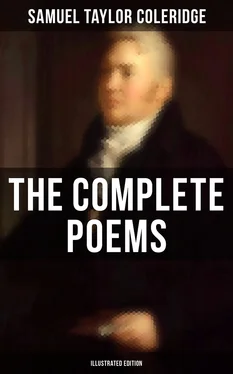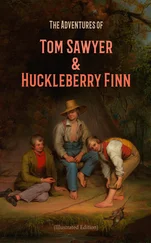THROUGH DOUBT TO FAITH
So far from deeming it, in a religious point of view, criminal to spread doubts of God, immortality and virtue (that 3 = 1) in the minds of individuals, I seem to see in it a duty—lest men by taking the words for granted never attain the feeling or the true faith . They only forbear, that is, even to suspect that the idea is erroneous or the communicators deceivers, but do not believe the idea itself. Whereas to doubt has more of faith, nay even to disbelieve, than that blank negation of all such thoughts and feelings which is the lot of the herd of church-and-meeting-trotters.
AN APOLOGY FOR COTTLE
The Holy Ghost, say the harmonists, left all the solecisms, Hebraisms, and low Judaic prejudices as evidences of the credibility of the Apostles. So, too, the Theophneusty left Cottle his Bristolisms, not to take away the credit from him and give it to the Muses.
FOR THE "SOOTHER IN ABSENCE"
His fine mind met vice and vicious thoughts by accident only, as a poet running through terminations in the heat of composing a rhyme-poem on the purest and best subjects, startles and half-vexedly turns away from a foul or impure word.
The gracious promises and sweetnesses and aids of religion are alarming and distressful to a trifling, light, fluttering gay child of fashion and vanity, as its threats and reproaches and warnings—as a little bird which fears as much when you come to give it food as when you come with a desire to kill or imprison it.
That is a striking legend of Caracciolo and his floating corse, that came to ask the King of Naples' pardon.
Final causes answer to why? not to how? and who ever supposed that they did?
O those crinkled, ever-varying circles which the moonlight makes in the not calm, yet not wavy sea! Quarantine, Malta, Saturday, Nov. 10, 1804.
THE CREATIVE POWER OF WORDS AND IMAGES
Hard to express that sense of the analogy or likeness of a thing which enables a symbol to represent it so that we think of the thing itself, yet knowing that the thing is not present to us. Surely on this universal fact of words and images depends, by more or less mediations, the imitation, instead of the copy which is illustrated, in very nature Shaksperianised—that Proteus essence that could assume the very form, but yet known and felt not to be the thing by that difference of the substance which made every atom of the form another thing, that likeness not identity—an exact web, every line of direction miraculously the same, but the one worsted, the other silk.
SHAKSPERE AND MALONE
Rival editors have recourse to necromancy to know from Shakspere himself who of them is the fittest to edit and illustrate him. Describe the meeting, the ceremonies of conjuration, the appearance of the spirit, the effect on the rival invokers. When they have resumed courage, the arbiter appointed by them asks the question. They listen, Malone leaps up while the rest lay their heads at the same instant that the arbiter re-echoes the words of the spirit, "Let Malone!" The spirit shudders, then exclaims in the dread and angry utterance of the dead, "No! no! Let me alone, I said, inexorable boobies!"
O that eternal bricker-up of Shakspere! Registers, memorandum-books—and that Bill, Jack and Harry, Tom, Walter and Gregory, Charles, Dick and Jim, lived at that house, but that nothing more is known of them. But, oh! the importance when half-a-dozen players'-bills can be made to stretch through half-a-hundred or more of pages, though there is not one word in them that by any force can be made either to illustrate the times or life or writings of Shakspere, or, indeed, of any time. And, yet, no edition but this gentleman's name burs upon it— burglossa with a vengeance. Like the genitive plural of a Greek adjective, it is Malone, Malone, Malone, Μαλων, Μαλων, Μαλων.
[Edmund Malone's Variorum edition of Shakspere was published in 1790.]
OF THE FROWARDNESS OF WOMAN December 11, 1804
It is a remark that I have made many times, and many times, I guess, shall repeat, that women are infinitely fonder of clinging to and beating about, hanging upon and keeping up, and reluctantly letting fall any doleful or painful or unpleasant subject, than men of the same class and rank.
NE QUID NIMIS
A young man newly arrived in the West Indies, who happened to be sitting next to a certain Captain Reignia, observed by way of introducing a conversation, "It is a very fine day, sir!" "Yes, sir," was the abrupt reply, "and be damned to it; it is never otherwise in this damned rascally climate."
WE ASK NOT WHENCE BUT WHAT AND WHITHER
I addressed a butterfly on a pea-blossom thus, "Beautiful Psyche, soul of a blossom, that art visiting and hovering o'er thy former friends whom thou hast left!" Had I forgot the caterpillar? or did I dream like a mad metaphysician that the caterpillar's hunger for plants was self-love, recollection, and a lust that in its next state refined itself into love? Dec. 12, 1804.
ANALOGY
Different means to the same end seem to constitute analogy. Seeing and touching are analogous senses with respect to magnitude, figure, &c.—they would, and to a certain extent do, supply each other's place. The air-vessels of fish and of insects are analogous to lungs—the end the same, however different the means. No one would say, "Lungs are analogous to lungs," and it seems to me either inaccurate or involving some true conception obscurely, when we speak of planets by analogy of ours—for here, knowing nothing but likeness, we presume the difference from the remoteness and difficulty, in the vulgar apprehension, of considering those pin-points as worlds. So, likewise, instead of the phrase "analogy of the past," applied to historical reasoning, nine times out of ten I should say, "by the example of the past." This may appear verbal trifling, but " animadverte quam sit ab improprietate verborum pronum hominibus prolabi in errores circa res ." In short, analogy always implies a difference in kind and not merely in degree. There is an analogy between dimness and numbness and a certain state of the sense of hearing correspondent to these, which produces confusion with magnification , for which we have no name. But between light green and dark green, between a mole and a lynceus, there is a gradation, no analogy.
COROLLARY
Between beasts and men, when the same actions are performed by both, are the means analogous or different only in degree? That is the question! The sameness of the end and the equal fitness of the means prove no identity of means. I can only read, but understand no arithmetic. Yet, by Napier's tables or the House-keepers' Almanack , I may even arrive at the conclusion quicker than a tolerably expert mathematician. Yet, still, reading and reckoning are utterly different things.
THOMAS WEDGWOOD AND REIMARUS
In Reimarus on The Instincts of Animals , Tom Wedgwood's ground-principle of the influx of memory on perception is fully and beautifully detailed.
["Observations Moral and Philosophical on the Instinct of Animals, their Industry and their Manners," by Herman Samuel Reimarus, was published in 1770. See Biographia Literaria , chapter vi. and Note , by Mrs. H. N. Coleridge in the Appendix, Coleridge's Works , Harper & Brothers, iii. 225, 717.]
HINC ILLA MARGINALIA
It is often said that books are companions. They are so, dear, very dear companions! But I often, when I read a book that delights me on the whole, feel a pang that the author is not present, that I cannot object to him this and that, express my sympathy and gratitude for this part and mention some facts that self-evidently overset a second, start a doubt about a third, or confirm and carry [on] a fourth thought. At times I become restless, for my nature is very social.
Читать дальше












